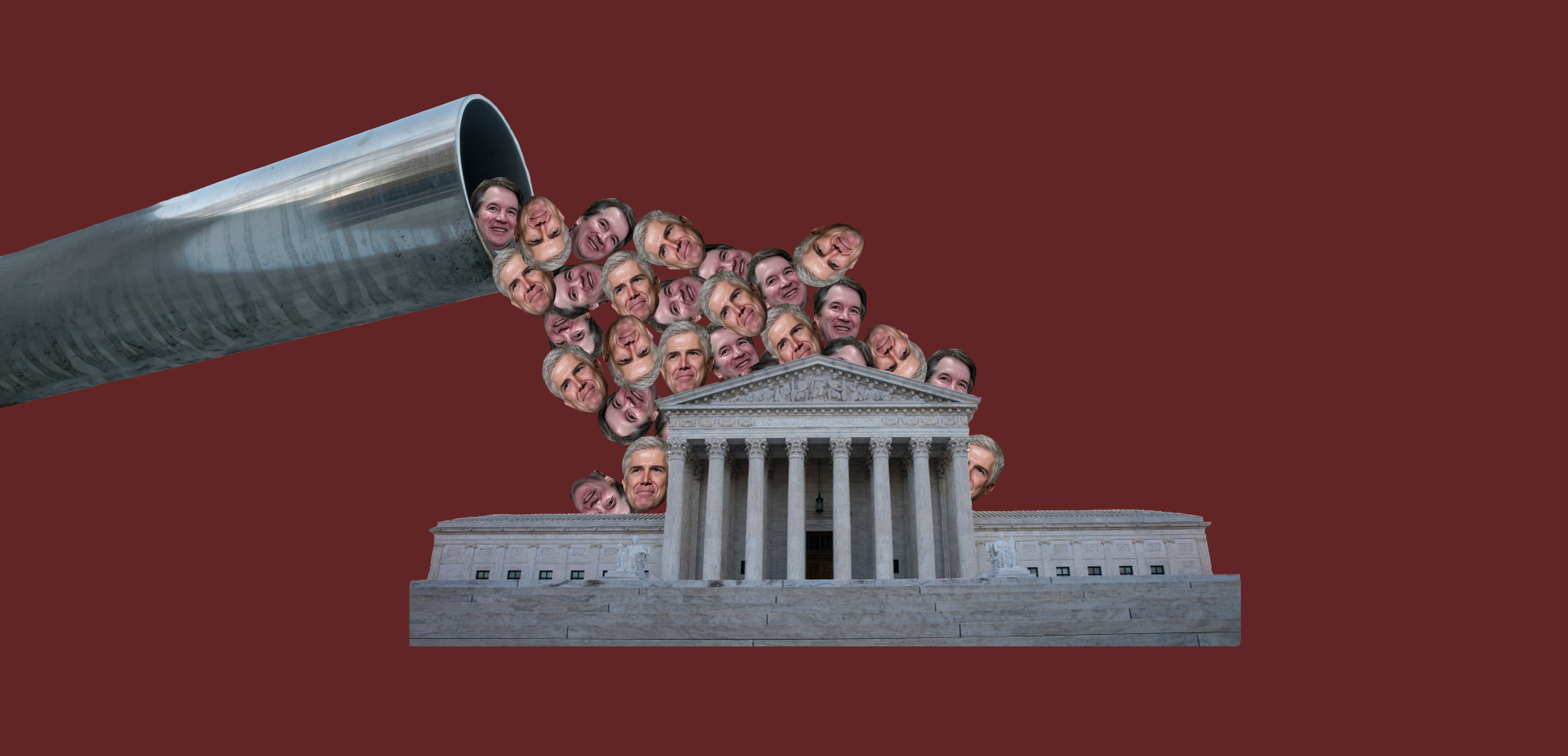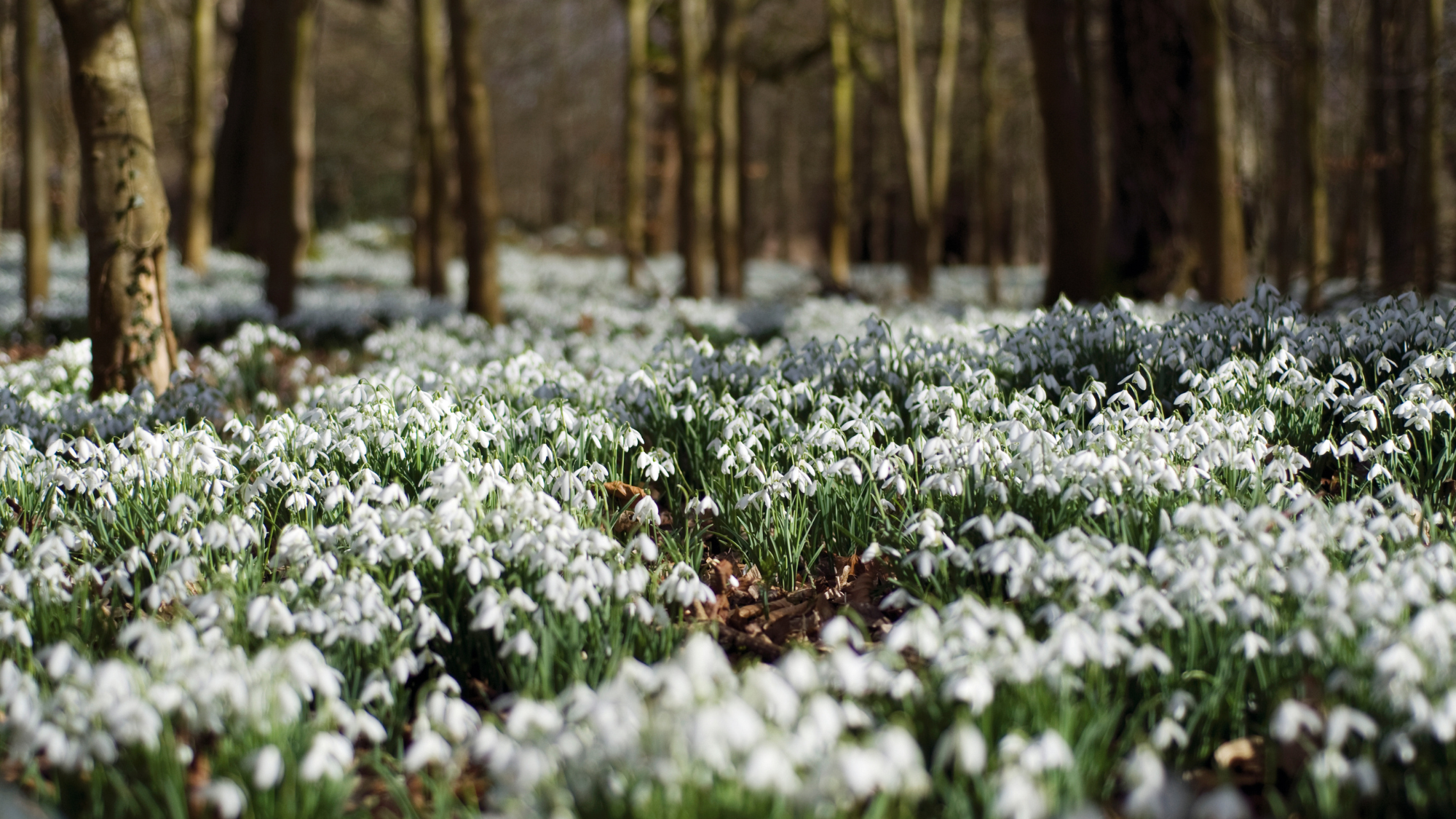How conservatives built a powerful judicial pipeline
The Federalist Society built a national farm system for conservative judges that has changed the nation

A free daily email with the biggest news stories of the day – and the best features from TheWeek.com
You are now subscribed
Your newsletter sign-up was successful
The Federalist Society built a national farm system for conservative judges that has changed the nation. Here's everything you need to know:
What is the Federalist Society?
It's an organization of more than 70,000 conservative and libertarian lawyers and law students with chapters at every accredited law school in the country. All of the Supreme Court's conservative justices — Clarence Thomas, Samuel Alito, Neil Gorsuch, and Chief Justice John Roberts — have been members, as has Brett Kavanaugh, President Trump's nominee to replace retired justice Anthony Kennedy. That's no coincidence: The Federalist Society exerts unparalleled influence over Republican judicial appointments, offering the definitive endorsement of a potential judge's conservative bona fides. Its members "place a premium on individual liberty, traditional values, and the rule of law," the society states. In practice, that translates to fewer restrictions on gun ownership and campaign donations, and opposition to legal abortion, government regulation of private industry, and race-based affirmative action policies that defy a "color-blind Constitution." During his campaign for president, Trump promised that all of his judicial appointees would be "picked by the Federalist Society."
The Week
Escape your echo chamber. Get the facts behind the news, plus analysis from multiple perspectives.

Sign up for The Week's Free Newsletters
From our morning news briefing to a weekly Good News Newsletter, get the best of The Week delivered directly to your inbox.
From our morning news briefing to a weekly Good News Newsletter, get the best of The Week delivered directly to your inbox.
How did the society start?
When Ronald Reagan led the conservative revolution that put him in the White House in 1981, law schools were dominated by liberal professors. A small group of conservative students at Yale and the University of Chicago banded together to challenge that status quo. The Yale students were led by professor Robert Bork, whom Reagan later nominated to the Supreme Court (he was rejected by Senate Democrats as too extreme). The Chicago students were mentored by Antonin Scalia, whom Reagan successfully placed on the court in 1986. Scalia and Bork were the leading proponents of originalism, which holds that judges should interpret the Constitution by attempting to discern the literal meaning of the text when it was written; if the Framers — the "Federalists" — didn't specify a right to abortion or to privacy, for example, then these rights have no constitutional basis. (Liberal justices, by contrast, perceive the Constitution as "a living document," whose descriptions of basic rights can be interpreted in a more expansive way tailored to modern circumstances.) Speaking at the society's 25th anniversary, Scalia said, "We thought we were just planting a wildflower among the weeds of academic liberalism, and it turned out to be an oak."
Why was the society so successful?
For decades, judges appointed by Republican presidents tended to drift to the left over the course of their careers. For example, one of George H.W. Bush's picks for the highest court, David Souter, ended up reliably siding with the liberal bloc, voting in 1992 in Planned Parenthood v. Casey to uphold the right to abortion established in Roe v. Wade. Originalism was created in part to guard against such betrayals by emphasizing a fixed interpretation of the law. After George W. Bush was elected president, conservatives loudly objected to his nomination of Harriet Miers to the Supreme Court, on the grounds that Miers — not a Federalist Society member — might drift to the middle like the Reagan appointee she was tapped to replace, Sandra Day O'Connor. Bush's second choice, Alito, was an active member of the society, and has been one of the court's most consistent conservative votes.
A free daily email with the biggest news stories of the day – and the best features from TheWeek.com
How does the society work?
The organization claims to be a nonpartisan "society of ideas," but that it shares objectives with the Republican Party is undeniable. It receives millions of dollars from conservative and libertarian megadonors such as the Mercer family and the Koch brothers; the society reported $28 million in assets in 2017. To help seed the system with conservatives, judges who belong to the Federalist Society give prestigious clerkships to fellow members, who then have a better shot at one day becoming judges themselves. "You have to have that army before you can credential them," said Curt Levey, whose Committee for Justice is closely allied with the Federalist Society.
Is Trump on board?
More than any president before him. Back in early 2016, then-candidate Trump was still struggling to convince Republican voters that he would nominate a conservative thoroughbred to replace Scalia, who had just died. His top campaign lawyer and eventual White House counsel, Donald McGahn, asked Leonard Leo, executive vice president of the Federalist Society, for suggestions; all but one of the names on Trump's list of 25 candidates were society members, including Gorsuch and Kavanaugh. Trump's decision to release that list won over social conservatives, said Republican strategist Scott Reed. "It was a brilliant strategy," he says, "and it worked."
Are the Federalists winning?
During the Obama years, conservatives lost major battles on gay marriage and the Affordable Care Act, but if Kennedy is replaced by Kavanaugh or another justice with Federalist views, the court will move significantly to the right for years to come. Trump also inherited more than 100 openings in the federal judiciary, mainly because the Republican-controlled Senate systematically blocked President Obama's appointments. Trump's tenure in office, Leo said, presents "an opportunity for transformation of the federal bench."
The limits of originalism
Originalism is based on the premise that judges can and should overcome personal biases and reach "neutral" conclusions about what the Constitution and the laws say. Like the related legal philosophy called textualism, originalism instructs judges to discern the meaning of laws as they were written, rather than considering their broader purpose or real-world consequences. But when law professor Geoffrey Stone once polled colleagues to identify the 20 most significant Supreme Court cases between 2000 and 2013, he found that in every case, Justice Antonin Scalia took the conservative side. Invariably, Scalia voted in favor of corporations, the National Rifle Association, the teachings of his own Roman Catholic faith on abortion and homosexuality, and, in the 2000 Bush v. Gore decision, a Republican presidential candidate. Liberal scholars argue that originalism is just a front for conservative views, and that it's not possible to discern without any personal bias the intended meaning and application of such ambiguous terms as "equal protection," "unreasonable," "probable cause," "due process," and "well-regulated militia." To insist that only originalists properly interpret what the Founders intended, the liberal justice William Brennan said in 1985, is "arrogance cloaked as humility."
-
 How corrupt is the UK?
How corrupt is the UK?The Explainer Decline in standards ‘risks becoming a defining feature of our political culture’ as Britain falls to lowest ever score on global index
-
 Best places to find snowdrops in the UK
Best places to find snowdrops in the UKThe Week Recommends The snowdrop season is upon us, with ‘blankets’ of the beautiful bloom signalling that spring is on its way
-
 The 8 best superhero movies of all time
The 8 best superhero movies of all timethe week recommends A genre that now dominates studio filmmaking once struggled to get anyone to take it seriously
-
 The billionaires’ wealth tax: a catastrophe for California?
The billionaires’ wealth tax: a catastrophe for California?Talking Point Peter Thiel and Larry Page preparing to change state residency
-
 Bari Weiss’ ‘60 Minutes’ scandal is about more than one report
Bari Weiss’ ‘60 Minutes’ scandal is about more than one reportIN THE SPOTLIGHT By blocking an approved segment on a controversial prison holding US deportees in El Salvador, the editor-in-chief of CBS News has become the main story
-
 Has Zohran Mamdani shown the Democrats how to win again?
Has Zohran Mamdani shown the Democrats how to win again?Today’s Big Question New York City mayoral election touted as victory for left-wing populists but moderate centrist wins elsewhere present more complex path for Democratic Party
-
 Millions turn out for anti-Trump ‘No Kings’ rallies
Millions turn out for anti-Trump ‘No Kings’ ralliesSpeed Read An estimated 7 million people participated, 2 million more than at the first ‘No Kings’ protest in June
-
 Ghislaine Maxwell: angling for a Trump pardon
Ghislaine Maxwell: angling for a Trump pardonTalking Point Convicted sex trafficker's testimony could shed new light on president's links to Jeffrey Epstein
-
 The last words and final moments of 40 presidents
The last words and final moments of 40 presidentsThe Explainer Some are eloquent quotes worthy of the holders of the highest office in the nation, and others... aren't
-
 The JFK files: the truth at last?
The JFK files: the truth at last?In The Spotlight More than 64,000 previously classified documents relating the 1963 assassination of John F. Kennedy have been released by the Trump administration
-
 'Seriously, not literally': how should the world take Donald Trump?
'Seriously, not literally': how should the world take Donald Trump?Today's big question White House rhetoric and reality look likely to become increasingly blurred